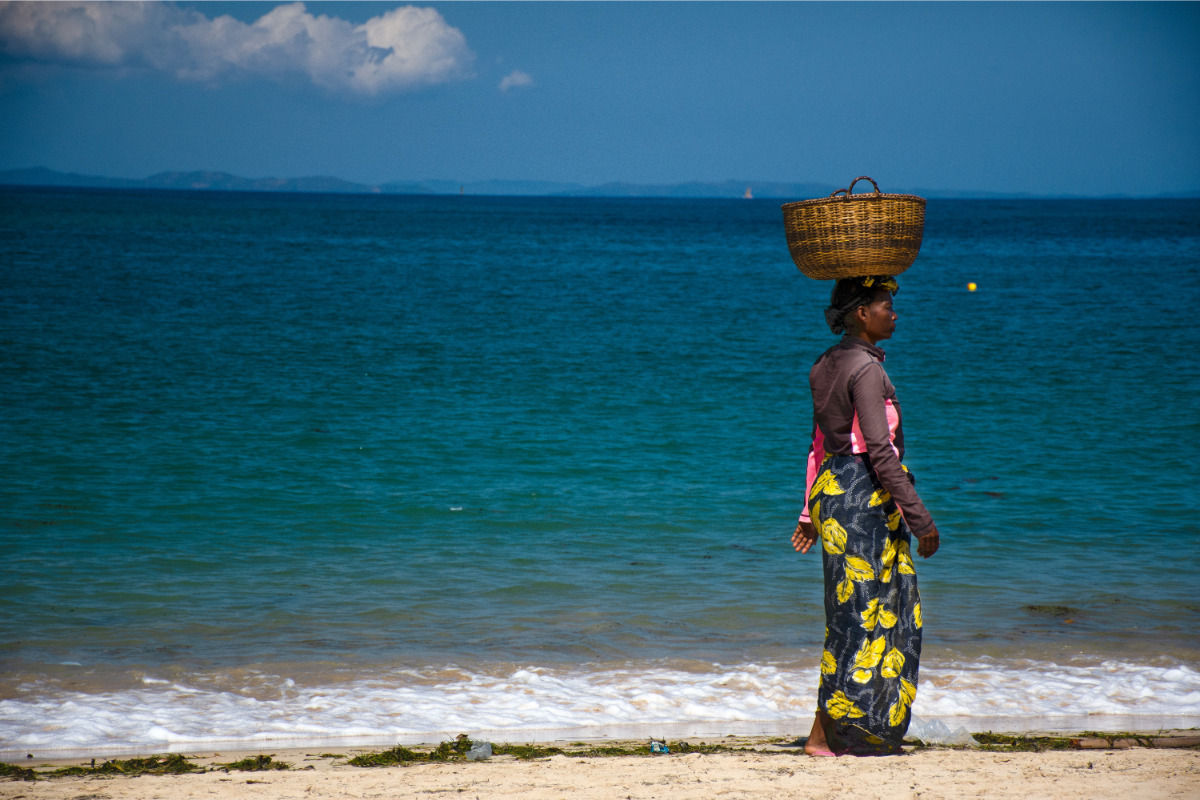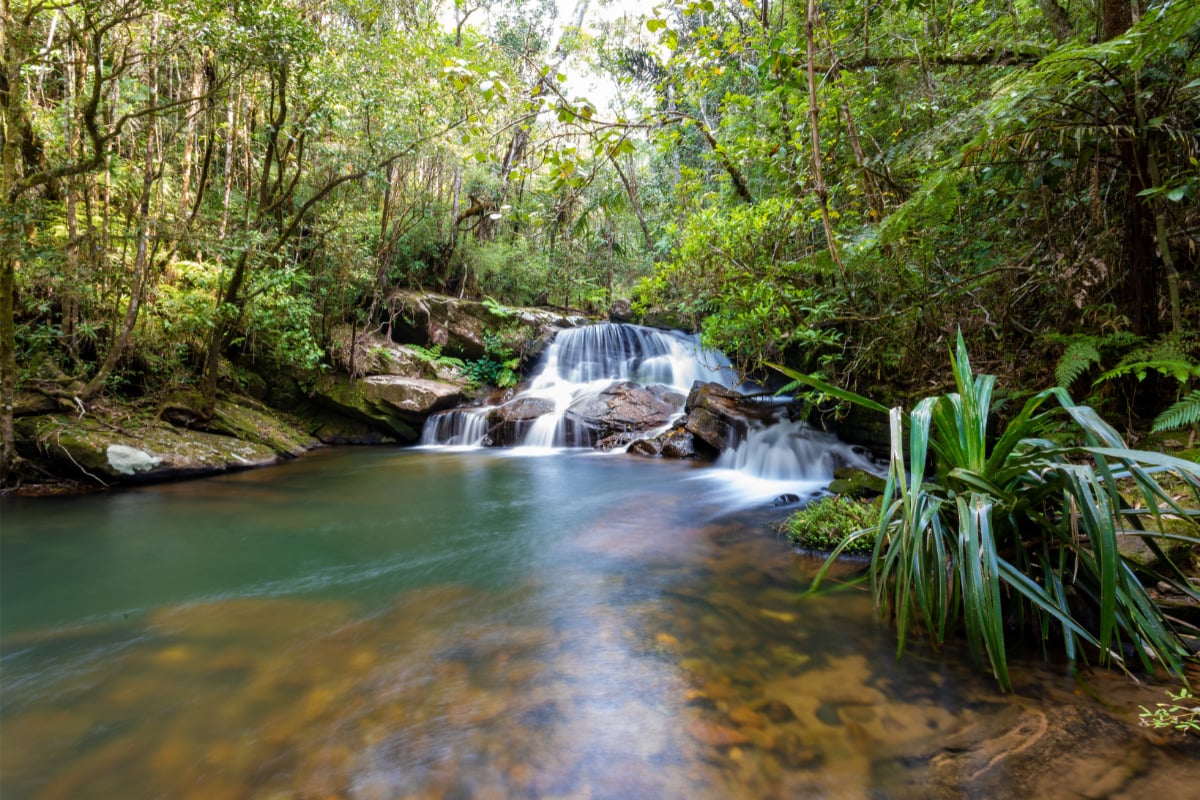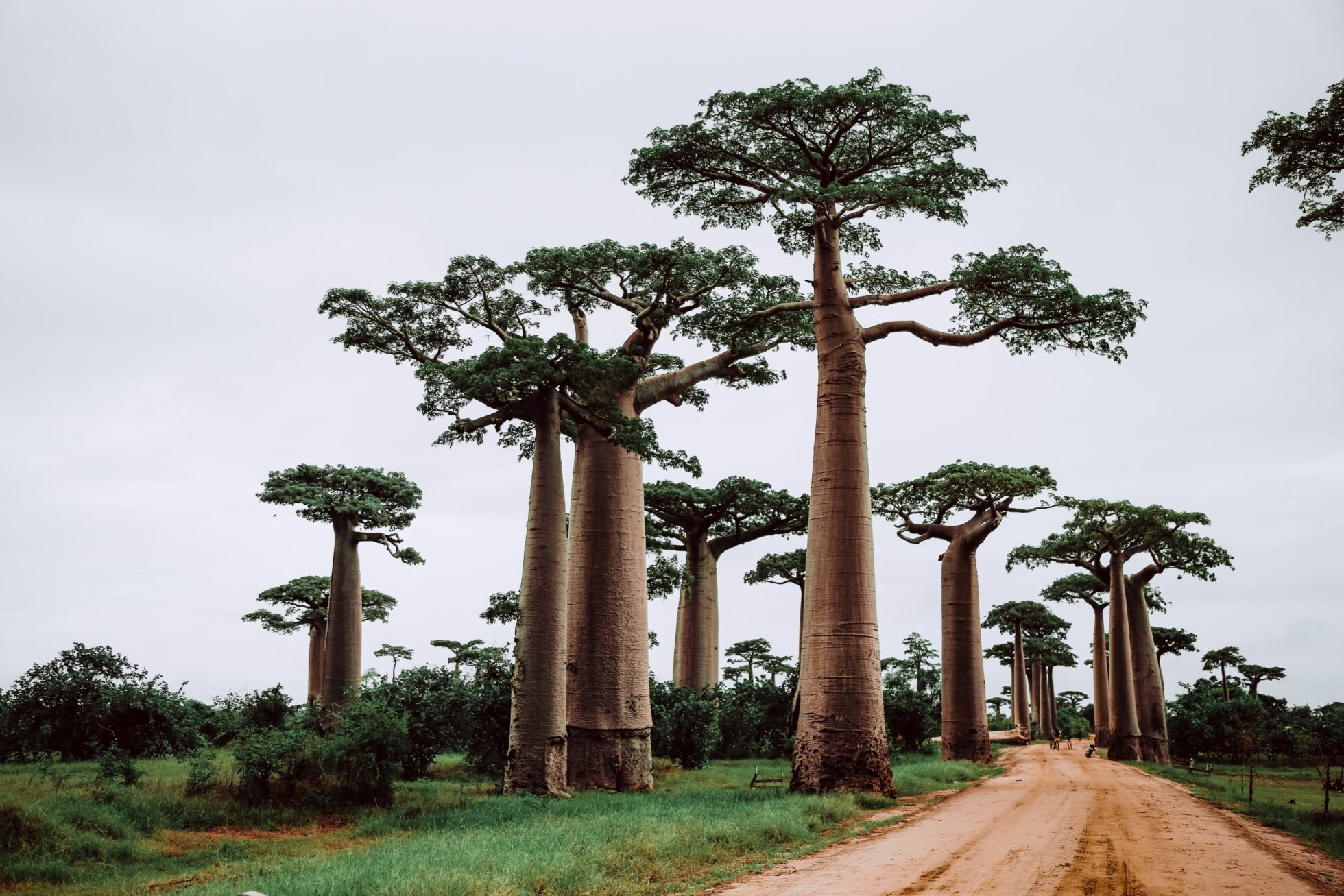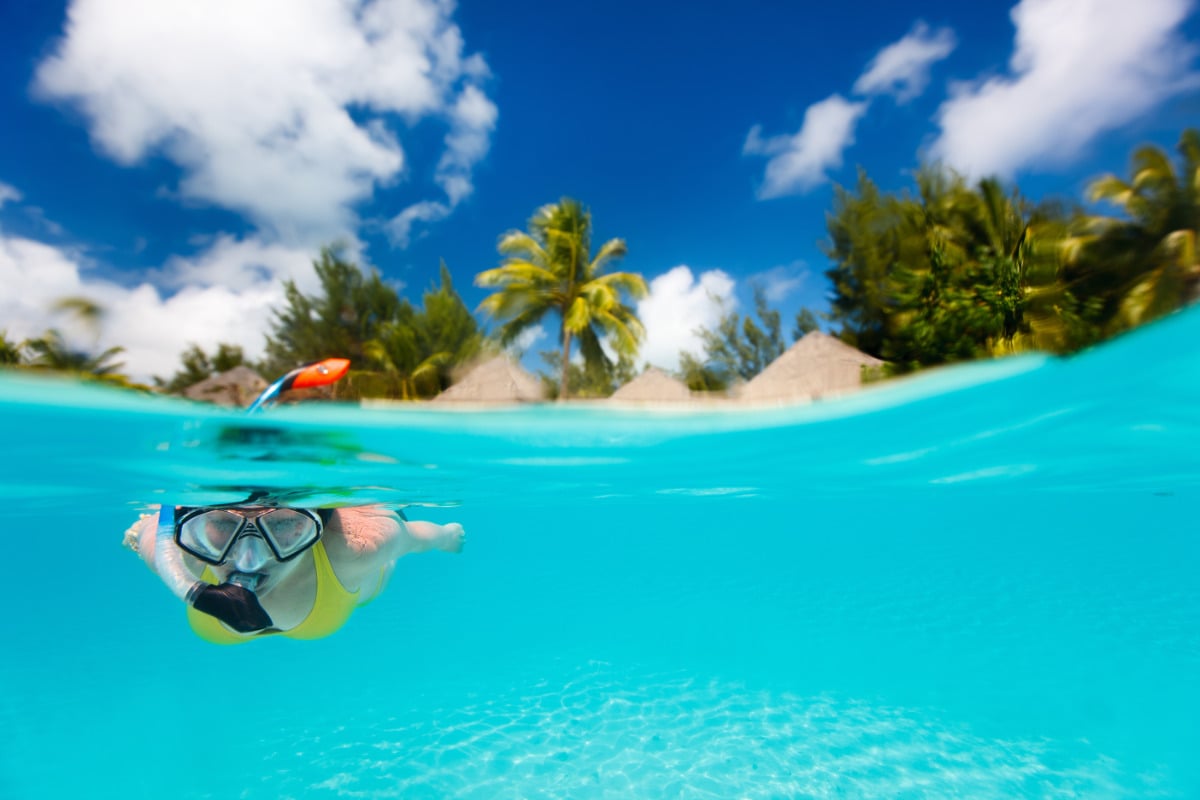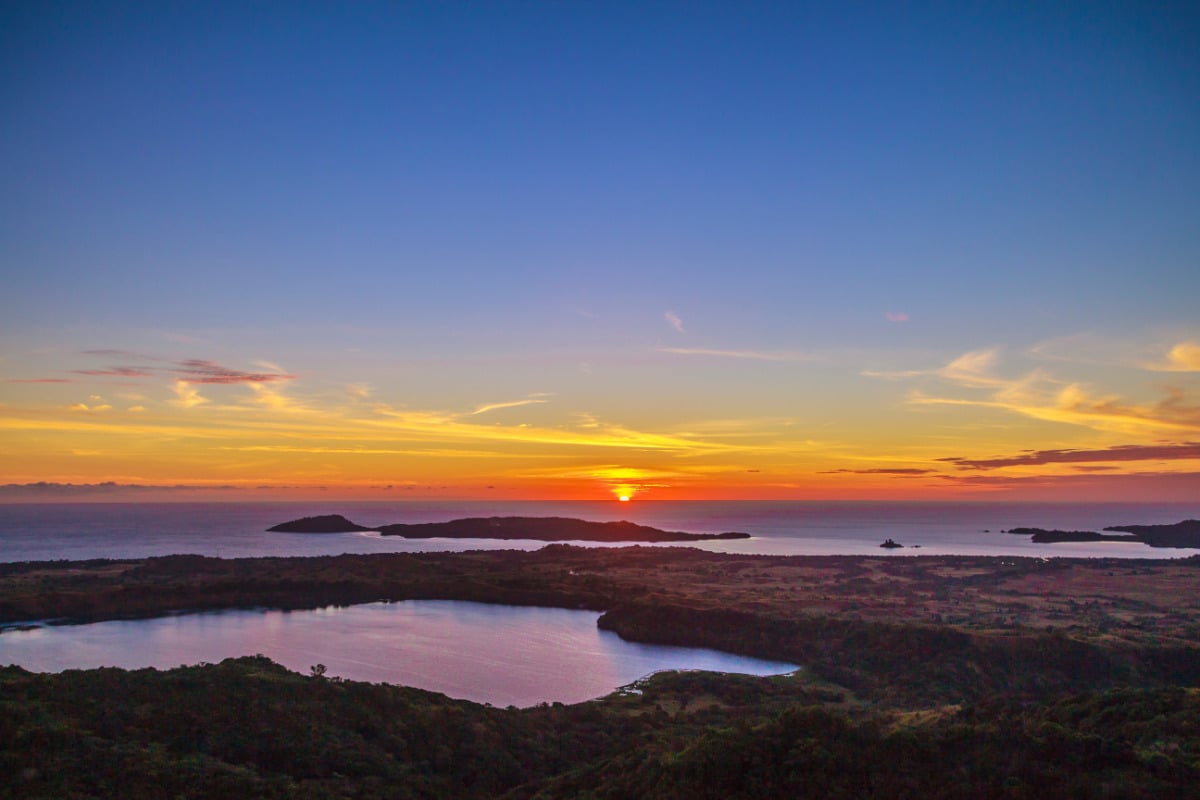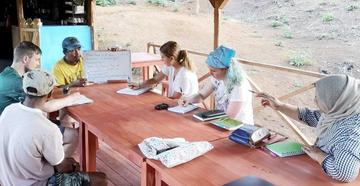
Discover. Teach. Learn.
English Teaching Internship in Madagascar
Start your career teaching English abroad on the tropical island of Nosy Be in Madagascar.
Program information
Start working abroad as an English teacher. Travel to the only remaining rainforest on the island of Nosy Be. Here, you’ll gain experience teaching primary school learners in a formal setting and adult learners in an informal setting. During the course of your internship, you’ll learn about the challenges of education and the importance of communication skills for achieving conservation goals.
Program overview
Get started teaching English abroad. You’ll be based on the island of Nosy Be, right next to Lokobe National Park, the last rainforest left on the island.
In the mornings, you’ll take a short walk to nearby communities to assist the local teachers with their primary school classes. You’ll work with them to prepare lesson plans and other resources to support the students in learning English and other subjects. In the afternoons, you’ll work near our community hub to support adult students.
This internship offers you the ability to gain experience in supporting a wide range of learners in a variety of settings. This means you’ll be able to learn a bunch of useful teaching skills. You can get involved in assisting established teachers, leading group classes and tutoring learners one-on-one.
Throughout your internship, you’ll be learning the Sakalava dialect of the local language, Malagasy. The country is historically and culturally complex and there will be opportunities to learn a little more about its diversity of distinct cultures. In addition, you’re welcome to visit the nearby rainforest and beach during your free time. Here, you’ll be able to spot critically endangered lemurs and sea turtles.
Highlights

Develop your professional teaching skills, including TEFL techniques, lesson planning, and early childhood developmental strategies.

Live on the edge of a national park filled with rare wildlife, tropical rainforest and adventure activities, and walking distance from the beach.

Contribute to ongoing community development efforts and initiate project ideas that will make a lasting impact.

Partner with social impact projects that are owned and led by local organisations who guide initiatives according to community priorities.

Receive training, guidance and mentoring to develop professionally and grow personally. Leave with recognised qualifications and in-demand skills.

Your unique expertise, skills and interests are matched to relevant community projects that address specific challenges.

Empower ongoing local community development projects on the ground that are led by inspiring local NGOs to make a lasting, systemic change.

Don’t just travel like a tourist. Become part of the local community and culture to experience a unique way of living – authentically.
Is this program for me?
This internship is specifically useful for someone who has or is actively studying the below subject areas at school, university or college, or has an interest in these subject areas.
- Education
- Liberal arts
- English
- History
- Communication
Activities
Some of the example typical activities you could participate in on this program.

Receive expert training on education project objectives and procedures, how to evaluate and monitor projects, and the local cultural context.

Gain experience teaching English as a foreign language to children, young adults and women. Classes can be structured or informal.

Take on additional responsibilities such as working closely with our partner organisations to assist with training and upskilling local teachers.

Learn how to plan and set team goals, create supportive team environments, and reflect on your own leadership style.

Take on responsibilities such as conducting community needs analyses, creating pre–and-post workshop surveys, or coordinating workshop sessions.

Conduct research into important topics relating to global public health, which will be used to create training, workshops and teaching resources.

Meet weekly in a small group with other interns and an experienced mentor to receive project guidance and feedback on your leadership style.
Skills
- Community empowerment
- Cross-cultural communication
- Social issues
- Student engagement
- Teaching English as a second language
- Teaching workshops
Program details
Dates and prices
Itinerary
06:00

06:00
07:00

07:00
08:00

08:00
12:00

12:00
13:00

13:00
15:30

15:30
18:00

18:00
19:30

19:30
What’s included?
General | |
|---|---|
| Food | |
| Safe and basic accommodation (usually shared) | |
| Airport pick up (unless stated) | |
| All project equipment | |
| 24-hour in-country support from local staff | |
| 24-hour emergency desk | |
| GVI Experiences |
Activities | |
|---|---|
| Sustainable project work | |
| Data collection and research | |
| Leadership responsibilities | |
| Personal project |
Mentorship | |
|---|---|
| Weekly group sessions | |
| Internship supervisor guidance |
Pre-program training | |
|---|---|
| Pre-departure webinar | |
| Pre-departure training (online) | |
| University of Richmond endorsed specialisation course | |
| University of Richmond endorsed leadership course |
Welcome training | |
|---|---|
| GVI welcome presentation | |
| Health & safety | |
| Local culture & environment | |
| UN SDGs | |
| Impact & ethics | |
| Child protection |
Advanced leadership training | |
|---|---|
| Personal development record | |
| Project planning and management |
Career services | |
|---|---|
| University of Richmond careers course | |
| Career coaching sessions (x2) | |
| Career guarantee | |
| LinkedIn reference – upon request | |
| Job portal |
Certificates | |
|---|---|
| Program certificate | |
| University certificate – specialisation (University of Richmond) | |
| University certificate – leadership (University of Richmond) | |
| University certificate – careers (University of Richmond) |
Not included |
|---|
| Flights |
| International and domestic airport taxes |
| Medical and travel insurance |
| Visa costs |
| Police or background check |
| Personal items and toiletries |
| Additional drinks and gratuities |
Life On Base
Base Photos
Our base is located on Nosy Be island – also known as the “Perfumed Island” because of its ylang-ylang plantations, which give off a beautiful floral scent during their flowering season. This island is also renowned for its extinct volcanoes, ancient rainforests and an abundance of rare and incredible species that cannot be found anywhere else in the world, such as the Nosy Be panther chameleon, the Hawks’ sportive lemur and the Madagascan fish eagle. Nosy Be means “big island” in the local Malagasy language, and is located off the northwestern coast of Madagascar.
On our community development programs, you’ll have the opportunity to work on projects with a focus on teaching English or gender equality.
On our teaching programs you’ll assist with teaching the English language – supporting the younger students with the language, as well as assisting with their grasp of environmental education. That will take place in the mornings. In the afternoons, you will be doing the same for adults. English is a vital skill for people to learn as it’s highly sought after in the local job market and tourism industry.
When you join a gender equality program, you’ll help tackle gender disparities. On Nosy Be island, women and girls have created a network centred on mutual support, confidence and skill growth. This initiative covers areas like career advancement, conservation awareness and gender equality. Your role involves collaborating, leading workshops, and assisting with community empowerment initiatives.
If you choose to complete a wildlife conservation program in Nosy Be your work will include trekking through the Lokobe National Park, (a “strict reserve”), looking for signs of critically endangered lemurs and the great variety of bird, reptile, amphibian and butterfly species that call this rainforest habitat home. Forest surveys are conducted in the morning or at night. With spectacular sunsets and sunrises over the Indian Ocean, there are bound to be many priceless photo opportunities during the course of your program.

Accommodation
Your accommodation – which is a stone’s throw from the beach – consists

Accommodation upgrades
Upgrades are available at Les Bungalows d’Ambonara guesthouse, which is a quick 10-minute drive from our base (you’ll need a taxi, wa...

Transportation
Travelling to and from Fascene Airport takes around 25 minutes, and...

Communication
You will have limited access to long-distance communications while on the program, so make sure that your friends and family know how often they can expect to hear from you. Par...

Meals
The Malagasy diet is mostly rice- and bean-based. A typical main meal consists of rice alongside servings of seasonal vegetables in a sauce, with...

Climate
Nosy Be has a hot, tropical climate all year round. The rainy, hotter season is between November and April, and the dry season from May to October. You can expect temperatures o...
GVI experiences included in your program, at no extra cost.
We want you to make the most of the chance to live in – and contribute towards – the most diverse and unique wildernesses and communities on earth. Introducing GVI Experiences – immersive adventure, cultural and wellness activities exclusive to GVI that have been specially designed in collaboration with our local partners to support and stimulate sustainable economic development.
Enhance your impact. Expand your adventure. Explore your world.
Free time
Joining a program not only allows you to collaborate with local communities, but also offers plenty of opportunities to explore the surrounding areas or travel further afield over weekends to see what other parts of the region have to offer.
Field staff are a great source of advice, and have helped us put together the following information on local travel options. Many decide to travel before or after their experience (subject to immigration restrictions), solidifying the lifetime friendships established on the program. Please note that the below suggestions are not included in the program fee, and are for you to organise at your own expense.
Weekend Trips

Cafes and markets
You can spend time in the village and visit a local market, cafe or...

Mont Passot
Mont Passot is the highest point on Nosy Be island, at 329 metres above sea level. It’s surrounded by eight crater lakes that are considered sacr...

Whale watching
June to September is humpback whale-watching season. During this season you can book a tour with a responsible, ethical tour provider. If you’re ...

Diving
Book a recreational dive to experience the exceptional variety of Indian Ocean marine life up close. Among the vibrant corals, you can spot a vas...

Beaches
Visit one of Nosy Be’s many palm-lined stretches of golden beach, such as Andilana, Ambondrona, Madirokely and Ambatoloaka, and enjoy a relaxing day swimming in the warm waters ...

The Sacred Tree
Visit the Sacred Tree, located close to Mahatsinjo village, on the western side of Nosy Be island. This huge banyan tree was planted by the queen of the Sakalava people in 1836,...

Lokobe National Park
We’re based right on the edge of Lokobe National Park which holds the last remaining preserved primitive forest on the island of Nosy Be. The for...
Further Travels

South Africa
South Africa is a mere three-and-a-half-hour flight from Madagascar. Fly to Johannesburg and book a safari tour through the famous Kruger National Park or experience the beauty ...

Seychelles
This breathtaking archipelago of islands is home to pristine beaches, coral reefs, nature reserves, as well as rare animals such as the giant Ald...

Mainland Madagascar
Visit the mainland to see a greater variety of species and experience other distinct cultures of Madagascar. See ring-tailed lemurs in Isalo National Park, hike the stone forest...

Neighbouring islands
Madagascar is surrounded by many islands and islets. From our location on Nosy Be Island
Cultural Immersion
Engaging intimately with a new context teaches global awareness, adaptability and critical thinking – skills highly valued in the modern marketplace. Local and cultural immersion is encouraged on all our programs around the world, and will also be one of the most enjoyable aspects of your experience. Luckily, there are many different activities that you can get involved in during your free time, or before and after your program.
On our community programs, the focus is on cultural topics, while on marine or wildlife programs the emphasis is more on the environmental element. Use your evenings and weekends to explore topics like local cuisine and religion, or how sustainable development challenges are affecting local contexts.

Marodoka cultural circuit
Marodoka village, which means “the ancient village” in Swahili, is located a few kilometres from Nosy Be’s centre. With exceptional architectural...

Wildlife
As a result of the island’s long isolation from neighbouring continents, Madagascar is home to endemic flora and fauna found nowhere else o...

Marine Life
The warm waters of the Indian Ocean surrounding Madagascar are home to a variety of marine species such as clownfish and manta rays. Depending on...

Crafts and produce
Many of Madagascar’s cultures have long-standing artisanal craft traditions. Some of these include intricate embroidery and brightly coloured baskets. Madagascar is also the pri...

Festivals and celebrations
The most notable festivals on the island of Nosy Be are dedicated to music. The Nosy Be Jazz Festival is held in April and the Donia Music Festival is held towards the end of Ma...

Languages
Most people in Madagascar speak Malagasy, a language with many dialects. The dialect that is most commonly spoken in the area in which we are based is Sakalava. Due to the influ...
Speak to alumni

If you’d like to find out what the experience of joining a GVI project is really like, simply contact us and we’ll put you in touch with one of our many Alumni.
We’ll try to match you to an Alum based on your location, nationality, age, stage of academic career, gender, and program interests. This allows you to gain insights into the experience that is most relevant to you.
Depending on your location you might be able to speak to an Alum over the phone or online, or meet up with them face-to-face at a coffee shop nearby. We also run a series of small events around the world where you can speak to GVI Alumni, Ambassadors and staff members.
Get a first-hand perspective
Meet the team
Get acquainted with the GVI Africa, Madagascar, Nosy Be family

Padraig O’Grady
Program Manager
Meet Padraig, also known as Pod, our Program Manager in Nosy Be, Madagascar. Pod is a passionate wildlife photographer and used to work professionally in the film and TV industr ...
Parent Info
‘If only every student could do this. It changes your life in all the right ways,’ says Chris Heritage, parent of Luke Heritage, one of our teen volunteers who has participated on two GVI programs, one in Costa Rica and another in South Africa.
We are a parent-run organisation that is incredibly serious about health and safety, and increasing the impact, as well as the long-term career benefits of our programs. Our programs help young people develop the skills to select a career path that is personally fulfilling, and live a life aligned to the well-being of our planet and the global community.
GVI is a proud member of the Gap Year Association.
Ken and Linda Jeffrey, whose son Sam volunteered with GVI in Thailand, talk about how the experience affected Sam. He also went on to volunteer with GVI again in South Africa. ‘I know it sounds like a cliche but in a sense, he did go away as a boy and he came back as a young man. Both of us could recommend GVI without any hesitation to any other parent thinking about exploring an opportunity for their children to explore the world and to see different parts of it.’
Parent Info Pack
Download the Parent Pack and learn more about:
Our staff: All our projects are run by staff, selected, vetted, trained, and managed by our central office.
Health and safety: Our safety practices include a child and vulnerable adult protection policy and high participant ratios.
Staying in touch: See what’s happening on base, by following a hub’s dedicated Facebook page.
Free parent consultations: We would love to talk to you about exciting opportunities available for your child.
Arrivals




When it comes to support, we ensure that each participant is provided with unparalleled, 360 degree support, from your initial contact with the GVI Family, all the way through your program, and even after, as you become part of the GVI Alumni Team.
As part of this promise, we will ensure, whenever possible, that one of our dedicated staff will be available to meet you at the airport. In most locations, we also set up a Whatsapp group to help with managing airport arrivals.
We will arrange with you prior to your departure that, should you arrive in the agreed upon pick up window, a member of our staff will be there to welcome you, easily identifiable in a GVI t-shirt or holding a GVI sign and wearing a friendly smile.
This means there will be someone there to greet you as you land, and from there you will be transported to your GVI base to start your adventure and meet the rest of your team.
Your Impact
All of our programs have short-, mid- and long-term objectives that align with the United Nations Sustainable Development Goals (UN SDGs). This enables us to report on our collaborative impact across the world in a streamlined manner, measuring which UN SDGs we are making a substantial contribution to. Furthermore, this will help our local partners and communities measure and visualise their contribution to the UN SDGs.
Prior to your arrival on base, you will be educated about the UN SDGs. Then once you arrive on base, you’ll learn about the specific goals we have in this particular location, our various objectives, and also clarification of how your personal, shorter-term involvement contributes to these.
Our aim is to educate you on local and global issues, so that you continue to be an active global citizen after your program, helping to fulfil our mission of building a global network of people united by their passion to make a difference.

With an abundance of diverse natural landscapes, a variety of unique, endemic species and a diversity of distinct cultures, there are many opportunities for expanding ethical and responsible ecotourism and cultural tourism throughout Madagascar, including on the Nosy Be island where we are based. The country’s truly special biodiversity makes it a precious conservation area. Our work on Nosy Be includes assisting local organisations and community members with gender equality initiatives and increasing their English language literacy so that they can better achieve education, economic development and conservation goals.
Conversational workshops with park rangers and other adults
We’re based at the edge of Lokobe National Park and work with the local community to improve their English language literacy through conversational English workshops. This skill assists them with achieving their conservation and professional development goals.
Primary school educator and student support
We work with several primary schooling educators in communities surrounding Lokobe National Park. We support them in improving their English language literary resources for learners between six and eleven years of age. In addition to creating resources for English language literacy, we also assist local educators with improving their resources on a range of other subjects and topics related to their goals for their students.
Community-led gender equality initiatives
Gender disparities exist in Madagascar, limiting opportunities for women and girls, especially in education and jobs. On Nosy Be, a women’s network promotes support, confidence and training, addressing key health and equality issues. We collaborate by expanding skill access, enhancing economic empowerment, and providing guidance for growth. This includes workshops, resource development, and capacity building within the network. Together, we work towards driving positive change.
The United Nations Sustainable Development Goals the GVI Nosy Be community hub contributes towards are Goal 4: Quality Education, Goal 5: Gender Equality, Goal 10: Reduced Inequalities, Goal 13: Climate Action and Goal 17: Partnerships for the Goals.
Project objectives
GVI Nosy Be long-term objectives:
1. Improve English language literacy resources for adults in the communities surrounding Lokobe National Park.
2. Improve English language literacy for Lokobe National Park park rangers.
3. Improve resources for primary school educators and their students in communities surrounding Lokobe National Park.
4. Support teacher training through workshops in educational approaches, skills and techniques.
5. Improve the opportunities and autonomy of local women and girls and raise awareness about the importance of women’s empowerment.
Our Ethics
Below is a list of core ethics and best practices we believe are essential to the operation of high quality, ethical volunteer and sustainable development programs. We believe that all responsible volunteer and sustainable development operations should focus upon these principles. If you are considering volunteering, these are some of the key considerations you should question, to ensure that your time and money contributes towards positive change.
We want to constantly develop our own understanding of ethical best practice. In so doing, we aim to provide an exemplary industry standard for other education institutions, international development organisations, and social enterprises. Our Badge of Ethics stands for the drive to always do good, better. Find out more, click on the Badge below.
Our 10 ethical commitments
01
Locally Driven, Collaborative Projects
We aim to design all our projects in collaboration with local organizations and communities and ensure that they are locally driven.
02
Clear Objectives & Sustainable Outcomes
We aim to clearly define short-, mid-, and long-term objectives with sustainable outcomes for all our projects.
03
Impact Reporting
We aim to track, record, and publish the impact of each of our projects.
04
Working Against Dependency
We aim to build in-country capacity by assisting local organizations in becoming self-sustaining.
05
Responsible Exit Strategies
For each local organization we work with, we aim to have a plan in place for withdrawing support responsibly.
06
Clear Roles & Specialized Training
We aim to ensure that every participant is assigned a clear role and that they are fully trained and supported to carry out their work by specialized staff.
07
Respect for all
In all our actions we aim to respect the skills and efforts of all and seek to protect the rights, culture and dignity of everyone who engages with GVI.
08
Local Ownership
We work to ensure that credit for the results of any project, along with any data collected, research conducted, or Intellectual Property developed, remains the property of local organizations.
09
Transitioning from the Orphanage Model
We do not condone and aim to withdraw support of orphanages and residential care centers.
10
Child and Vulnerable adult policies
We will live by our Child Protection and Vulnerable Adult policies.
Continual Development
As an organization, GVI is committed to striving toward best practice, and to educating both our potential participants, our partners, and the world at large about them. Both the volunteering and sustainable development sectors are increasingly, and rightly, under scrutiny. Many recent local and global articles highlight poor practices and questionable ethics. GVI is widely recognized for striving to apply global best practice in the volunteering, education and sustainable development sectors throughout our operations by reputable organizations such as ChildSafe.
However, global best practice is always evolving and we dedicate both time and resources to engage with internationally respected experts and learn from the latest research to ensure our programs both fulfil their potential to create maximum positive impact, and minimise their potential to create unintentional negative impact. Along with and as part of the sustainable development and volunteering community, we are constantly learning and applying this learning to practice. We do not always get everything right, but we seek feedback from our community members, partners, participants and our staff, and react accordingly. We know are already doing a great job, and feedback we have received confirms this, but we aim to do even better and are continuously refining our operations to improve upon our already excellent reputation.
Program ethics
No entertainment-based activities
We don’t support the use of wild animals for entertainment purposes. This includes riding animals, having them perform tricks, feeding or bathing them or getting close to them to take photos
No orphaned animal sanctuaries
We don’t encourage, support or allow the rearing of “orphaned” wild baby animals kept at a “sanctuary”. The conservation value of these types of programs is negligent and would only ethically be used in extremely rare cases
Guidelines for touching or movement restriction
When wild animals are restricted for conservation purposes we follow the guidelines of Fair Trade in Tourism South Africa (FTTSA), approved by the Global Sustainable Tourism Council.
Animal welfare guidelines
We ensure that the Five Freedoms of Animal Welfare are followed. These include the freedom to express normal behaviour and freedom from distress, discomfort, hunger, thirst, fear, pain, injury or disease.
Local community empowerment
We ensure that conservation efforts are also always locally led, that community needs are front-and centre of any conservation effort and that our participants, projects and partners work to increase local community engagement in local conservation efforts.
No veterinary programs
We don’t offer any veterinary programs or animal rescue and rehabilitation programs. We don’t allow participants to do any work they would not be able to do in their home country.
No orphanage programs
We don’t support or allow participants to work in institutional residential care facilities, also known as orphanages. We partner with ReThink Orphanages and Freedom United.
Child and vulnerable adult protection policy
Our Child and Vulnerable Adult Protection Policy requires all our staff and participants to complete a criminal background check and to learn why you shouldn’t reveal a child’s identifying factors in photographs. We support the ChildSafe Movement.
No medical volunteering
We don’t offer any programs where our participants engage in medical treatment. This is because our participants aren’t typically qualified to do this work and would therefore not be able to do this work in their home country. Our participants only assist with public health programs.
No disability support programs
We don’t offer any programs where our participants work directly with people with disabilities. This is because our participants aren’t typically qualified to do this work and would therefore not be able to do this work in their home country.
Training
A GVI program is an investment in your career. No matter which you choose, you will be working toward improving your employability by mastering new social skills, gaining further technical expertise and earning qualifications in many cases. Most of our staff are, in fact, GVI Alumni, and we have helped many of our Alumni discover, move toward, and earn their own personal dream jobs. Each program includes introductory workshops, ongoing presentations, as well as on-the-ground professional support provided by our very own trained staff members. In addition, our training programs are critical for helping us to ensure the long-term impact of our sustainable development projects around the world.
For all GVI participants
Orientation: Travelling Responsibly and Ethically
Learn about the importance of child and vulnerable adult protection best practices and how to apply them while on project.
Orientation: UN Sustainable Development Goals
Introduction to the history and evolution of sustainable development, the United Nations Sustainable Development Goals (UN SDGs) and how these related to your project work.
Orientation: Further Opportunities for Impact
Learn about our country locations and further opportunities available to you during or after your program.
For all participants at Nosy Be
Community: Gender Equality
Learn about gender equality, skills development and examples of income-generating activities.
Community: Human Empowerment
Learn about our empowerment principles.
Certificates & qualifications

University of Richmond Careers in Sustainability certificate
Career paths in social and environmental impact are not as well-established as in other fields. That’s why we’ll provide our interns who have successfully completed their program with our Careers in Sustainable Development course. In this course, you’ll learn about current and emerging opportunities in a range of sectors, allowing you to make the best decision about your future.
This online course, valued at £295, is included in all internships. Full course details can be found here.

University of Richmond Leading Teams for Impact certificate
Leadership is a critical skill set for anyone looking to make an impact or drive sustainable development. Develop your own leadership style and learn how to set achievable objectives, give effective feedback and manage conflict successfully. After successfully completing the course, which you have the option of doing prior to your in-country program, you’ll receive a certificate from the University of Richmond.
This online course, valued at £295, is included in all volunteering programs. Full course details can be found here.

University of Richmond Community Development certificate
In this course, you’ll explore the most common pitfalls of community development initiatives so that you can avoid them. You’ll also learn how to carry out community development work effectively and ethically and how local context impacts program development. After successfully completing the course, which you have the option of doing prior to your in-country program, you’ll receive a certificate from the University of Richmond.
This online course, valued at £295, is included in all volunteering programs. Full course details can be found here.
Careers
Benefits
Career mentorship
Receive continuous support through mentoring sessions with a qualified supervisor to help you achieve your professional goals.
GVI career course
Complete an online course in sustainable development careers and obtain a certificate accredited by the University of Richmond.
Career coaching sessions
Take the next step in your career with two one-on-one career coaching sessions from a remote mentor to guide and advise your professional development.
Job portal access
Gain exclusive access to our carefully curated job portal that advertises vacancies in the conservation and development sectors.
LinkedIn reference
Get a professional endorsement from GVI on the world’s largest careers platform to make you stand out.
The GVI Online Careers Course is in partnership with the University of Richmond

Preferential recruitment

Support & Safety
We won’t sugarcoat it — traveling abroad is usually a complex process that carries an element of risk. But this is exactly why we’re passionate about providing extensive support throughout the process as well as the highest safety standards during the in-country phase. We believe that volunteering abroad should not only be impactful, but an enjoyable experience that carries as little risk as possible. This is exactly how we’ve been able to maintain our reputation as the most highly respected volunteering organisations in the sector over the past two decades.


Health and safety case studies

How GVI upholds health and safety
It takes courage to book a GVI program, get on a flight, and head off to somewhere new. Volunteering offers a level of cultural immersion that typical backpacking or holidays ju...

GVI's commitment to safety and security
As the saying goes: ‘Expect the best, plan for the worst’. Cliched or not, we take it to heart. This tenet is at the core of how GVI operates when it comes to promoting the heal...

How GVI remains prepared for natural disasters
The weather isn’t just a topic for polite small-talk here at GVI. We have emergency action plans in place for all scenarios. So when the weather, or other natural forces, takes ...

How GVI manages participants expectations
Once GVI has matched a participant to a program that suits their passions and goals, our team aims to set the right expectations for them. In the event that false expectations a...
Make the most of our unique programs with these exclusively curated local adventure and wellness experiences.












Want to connect with some of our past participants about their adventures? Get in touch with hundreds of friendly ambassadors all over the world who would be more than happy to answer any questions.





